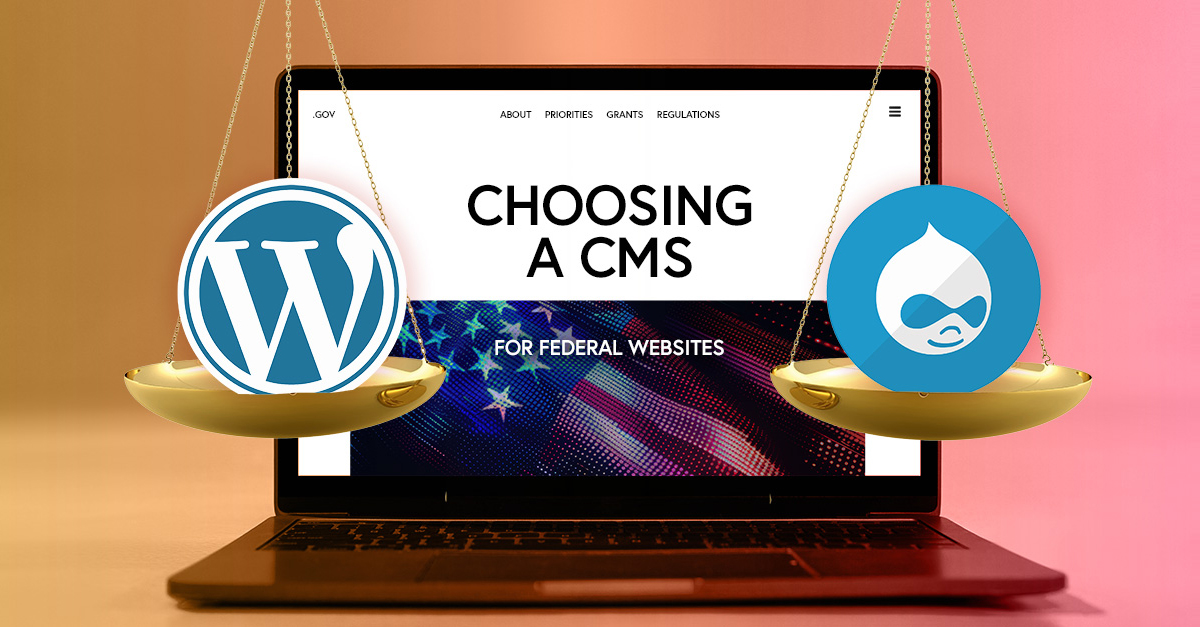WordPress and Drupal are among the most commonly used platforms for building websites and other digital experiences. This is particularly true for large sites that get a lot of traffic. According to 2024 stats, WordPress powers nearly 30% of the top 1 million websites based on traffic. Drupal is a distant, but notable, second at just under 3%.
Despite WordPress’s stronger market position, when it’s time to modernize .gov sites, agency leaders often shy away because of perceived security vulnerabilities.
But are those perceptions valid? And what else should feds consider when selecting a content management system (CMS)?
We asked two of Spire’s seasoned developers – Chris Bubny and Zelalem Tekle – to break it down.
Is Drupal more secure than WordPress?
Between us, we’ve built dozens of sites for security-conscious agencies and commercial clients – some on WordPress, some on Drupal. Both are attractive targets for hackers because they’re open source and because the sites that use them are well known. Code once, hack big, if you will.
The WordPress and Drupal teams take an equally proactive approach to security, continuously hardening the core software against evolving threats.
Drupal has a few security advantages – like robust access controls and high coding standards. But with proper security measures, a WordPress site can be just as secure as a Drupal site – so long as it’s properly configured and kept up to date.
Which delivers the best performance at scale?
Site performance is a high priority for a federal website redesign – especially for sites with lots of content and high traffic. Citizens expect pages to load in seconds. Anything slower leaves them frustrated.
Out of the box, Drupal is more flexible and customizable than WordPress, making it ideal for large, complex websites – especially those that need to present multiple language versions. That said, WordPress has a slight speed advantage because its core code is lightweight.
Agencies need to remember that site speed depends on much more than the CMS. Host server configuration, databases, caching, image size, and content delivery networks (CDNs) all contribute to performance.
Both Drupal and WordPress can be effectively optimized to meet the demands of even the busiest federal websites. But for content-heavy sites with complex taxonomies and integrations with big databases or other systems, Drupal is the better choice.
What about cost?
For any tech decision, agency leaders must consider total lifecycle costs. For open-source solutions like WordPress and Drupal, there’s no licensing fees. But it takes skilled designers and developers to build and maintain a government website. Agencies should also consider the learning curve a new CMS presents for their content teams.
This is where WordPress really shines. The platform was built for ease of use, and it’s amassed a large community of themes, extensions, and other resources for designers and devs.
- Updates are seamless – with automatic and one-click options and fewer major core changes.
- Upgrades are managed to allow backwards compatibility for plugins, which means they don’t trigger additional development to keep site features and functions intact. (As a security measure, plug-ins that fail to follow WordPress’s evolving protocols may be removed from the directory.)
- The content interface is simple and visually appealing, with a single dashboard where editors can access most settings and features.
In contrast, Drupal requires more technical skills. With a higher labor rate for skilled devs, agencies face higher development costs at all phases of a Drupal project.
- The theming engine and a more limited ecosystem of modules mean custom designs require more effort.
- Its architectural complexity means it takes longer to develop extensions
- Major version upgrades aren’t always backwards compatible, which can mean additional development or content migration.
- Drupal’s CMS presents a steeper learning curve for users who are new to the platform.
So which is the better platform for government websites?
As with so many things, the truest answer is “it depends.”
Drupal is more flexible and thus better for highly customized designs, complex taxonomies, dynamic content integrations, and teams that require complex roles and permissions. By comparison, WordPress can easily support websites of medium complexity, as well as larger and more complex sites, at a lower overall cost across the lifecycle.
Other important considerations for federal agencies are security, performance, and scalability.
If you want to see both platforms in action, major site that use Drupal are hhs.gov and dhs.gov. Major sites on WordPress include nasa.gov, state.gov, and whitehouse.gov.
And if it’s time to modernize your .gov website, check out our full suite of design and development services. Our devs are ready to help you choose the right CMS for your agency.









